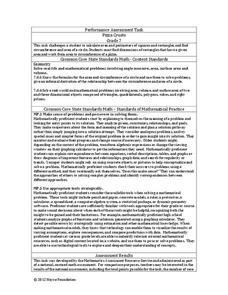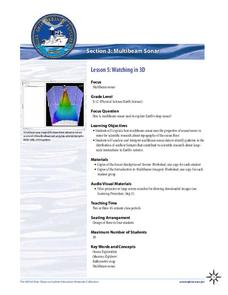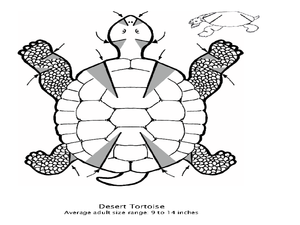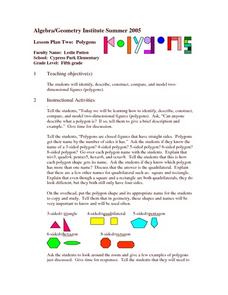Curated OER
Protein Puzzles
High schoolers examine the concept of protein structure. They read an article, construct a three-dimensional model of an insulin protein, take a quiz, conduct Internet research, and answer discussion questions.
Curated OER
Comparing Measurements
Students explore measurements by completing worksheets in class. In this geometry lesson, students identify the basic measurement units in both the English and metric systems. Students analyze 2 and 3 dimensional objects and identify...
Curated OER
Geometry Journal: Classifying Solids
In this geometry worksheet, 10th graders respond to journal prompts related to prisms and classifying solid shapes. The two page worksheet contains nine questions. Answers are included.
Curated OER
Angles Lesson Plan
Students explore the relationship of angles as it relates to 2 and 3-D shapes. For this geometry lesson, students differentiate between acute, obtuse, right, alternate interior, exterior and adjacent angles. They manipulate a math...
Curated OER
Shapely Figures
Middle schoolers are given magazines, scissors, glue, and one sheet of construction paper. They look for pictures showing real life representations of rectangular prisms, spheres, cones, and pyramids. Pupils cut out pictures showing each...
Curated OER
Chopping Cubes
Middle schoolers work in small groups to make various geometric solids with Play-Doh. They use fishing line to make cuts and observe the shapes of the cross-sections. Pupils complete an assessment in which they answer questions such as:...
Curated OER
Exploring the Properties of Rectangular Prisms.
Students define properties of rectangular prisms. In this geometry lesson, students identify the relationship between two and three dimensional objects. They use Cabri technology to graph their figures.
Noyce Foundation
Pizza Crusts
Enough stuffed crust to go around. Pupils calculate the area and perimeter of a variety of pizza shapes, including rectangular and circular. Individuals design rectangular pizzas with a given area to maximize the amount of crust and do...
Curated OER
Teaching About Plate Tectonics and Faulting Using Foam Models
Young scientists learn about plate tectonics and the three different types of faults (normal, reverse, and strike-slip) using foam models. The activity also covers common types of locations where these faults are found.
NOAA
Watching in 3D
Bring the ocean floor to life! Earth science scholars discover the process of deep sea mapping in the third installment in a series of five lessons about ocean exploration. The teacher's guide includes helpful resources, worksheets, and...
Curated OER
Surface Area
Sixth graders compute the surface area. In this surface area lesson students are given a set of problems to calculate. They compute the surface area of cubes and rectangular boxes.
Curated OER
Searching for Angles and Lines
Students work to find and reinforce concepts related to lines and angles. They identify the characteristics of shapes that have one, two, and three dimensions. The students also work on definitions related to the geometry of shapes.
Curated OER
Moving Day!
Eighth graders continue their geometry unit by focusing on volume. Using data, they create a spreadsheet, estimate and calculate volume. They solve real-life problems and round their answers to the hundredths place. They also practice...
Curated OER
Circles, Cylinders, Cones and Spheres
In this comparing geometric figures worksheet, students continue patterns and observe circles. In this problem solving worksheet, students answer seven questions.
Curated OER
Diamond Terrapin Fun Facts
In this animal learning exercise, students complete 6 pages of activities and exercises pertaining to the diamondback terrapin. Students read about the life cycle, study habitat maps and color and cut out a three dimensional turtle.
Curated OER
Tangram Perimeters
Students work together to make figures out of tangram squares. In groups, they calculate the measurements they need and apply the Pythagorean Theorem. They complete a worksheet solving equations using the theorem and review their answers.
Curated OER
Spatial Relationships
Students investigate the geometry concept of spatial relationships. They draw a replica of a cube. Students list the planes on the cube and go into further depth with identifying the parallel line in segments of the cube. The...
Curated OER
Orbital path of Landsat
Students comprehend how Landsat satellites orbit teh Earth to produce images. They comprehend the elliptical path of satellites. Students recognize that a different orbital path is needed for different satellites to perform their tasks....
Curated OER
Dinosaur Math
Second graders practice vocabulary related to measurement, mathematics, and dinosaurs. Using the engaging topic of dinosaurs, learners will calculate various information about dinosaurs and use measurement vocabulary. They will also...
Curated OER
Parks Design Project
Learners explore two dimensional geometric figures. They explore the relationships and measurements of geometric figures. Students apply proportion and scaling. They design a city park for learners and teenagers.
Curated OER
Relations
Students identify, compare, and analyze shapes and numbers. In this analogies and comparison math lesson, students warm up by completing 4 worksheets to familiarize themselves with analogies. In small groups, students are challenged to...
Curated OER
Working With Electronic Topography Maps
Junior geologists examine topographic maps online and learn how to read them. they answer seven associated follow-up questions. This lesson plan is only a general outline and does not provide the details or the websites that you would...
Curated OER
Lesson Plan Two: Polygons
Learners explore the concept of polygons on a two-dimensional plane. They identify polygons in everyday life and draw different polygons according to their classification. Using a geoboard and geobands, they consrtuct polygons and even...
Pennsylvania Department of Education
Problem Solving with Fractions
Solve story problems using fractions or decimals. Then, determine the reasonableness of answers using estimation.The detailed activity includes essential questions, vocabulary, a materials list, and links to related units.

























